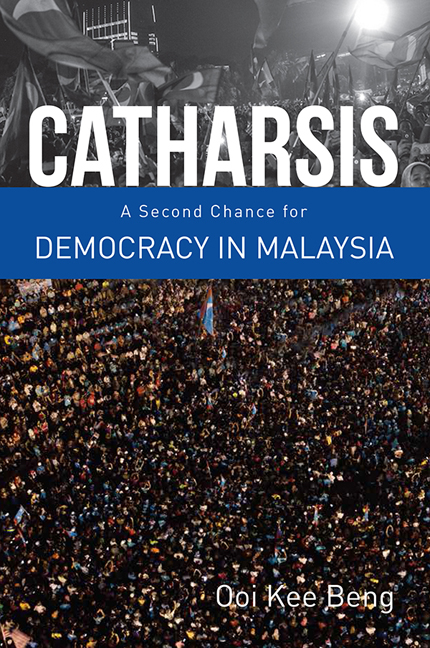Book contents
- Frontmatter
- Contents
- Foreword
- 1 Introduction – Malaysia's Future Is Redeemed
- Before Pakatan Harapan
- Before 9 May 2018
- With Mahathir at the Helm
- 31 One Thing Is Certain—There Will Be More Amendments to the Constitution
- 32 The More Things Change, the More Things May Actually Change
- 33 Did Merdeka Liberate or Create Malaya?
- 34 Interview with Nurul Izzah Anwar: Rebuilding a Nation Long Divided
- 35 The Diminishing of Humans Through Identity Politics
- 36 The Art of Dismantling Cultural Pluralism
- 37 No Need to Let Bigots Dictate Policy
- 38 What the Penang Floods Say About Malaysian Politics (and It's Not Just About Climate Change)
- 39 This is the Moment of Truth for Malaysia's Race-based Politics
- 40 We are Equal Only Through Our Vote
- 41 Why the Opposition Has a Shot at Toppling the Barisan Nasional with Mahathir at the Helm
- 42 Spiralling Back towards Reformasi
- 43 Individual Freedom Is a Matter of National Survival
- 44 Why Meet the Twenty-first Century with Twentieth Century Mindsets?
- 45 A Final Quarrel between a Repentant Grandfather and Oldfashioned Self-absorbed Parents
- 46 Outraged Enough to Go Vote or Cynical Enough to Stay Home?
- Beyond 9 May 2018
- About the Author
38 - What the Penang Floods Say About Malaysian Politics (and It's Not Just About Climate Change)
from With Mahathir at the Helm
Published online by Cambridge University Press: 12 February 2019
- Frontmatter
- Contents
- Foreword
- 1 Introduction – Malaysia's Future Is Redeemed
- Before Pakatan Harapan
- Before 9 May 2018
- With Mahathir at the Helm
- 31 One Thing Is Certain—There Will Be More Amendments to the Constitution
- 32 The More Things Change, the More Things May Actually Change
- 33 Did Merdeka Liberate or Create Malaya?
- 34 Interview with Nurul Izzah Anwar: Rebuilding a Nation Long Divided
- 35 The Diminishing of Humans Through Identity Politics
- 36 The Art of Dismantling Cultural Pluralism
- 37 No Need to Let Bigots Dictate Policy
- 38 What the Penang Floods Say About Malaysian Politics (and It's Not Just About Climate Change)
- 39 This is the Moment of Truth for Malaysia's Race-based Politics
- 40 We are Equal Only Through Our Vote
- 41 Why the Opposition Has a Shot at Toppling the Barisan Nasional with Mahathir at the Helm
- 42 Spiralling Back towards Reformasi
- 43 Individual Freedom Is a Matter of National Survival
- 44 Why Meet the Twenty-first Century with Twentieth Century Mindsets?
- 45 A Final Quarrel between a Repentant Grandfather and Oldfashioned Self-absorbed Parents
- 46 Outraged Enough to Go Vote or Cynical Enough to Stay Home?
- Beyond 9 May 2018
- About the Author
Summary
Extreme Weather hits most places on Earth every now and then and recently more than ever. But when freak storms appear with an intensity stronger and more devastating than living memory can recall, it is wise to conclude that we should not take blue skies and cooling rainfalls for granted.
More obviously, governments should begin thinking very seriously about how the effects of dramatic climatic change can be mitigated at the most local level. If there is any lesson to be learned from the tropical storm that hit northern Malaysia, most notably the state of Penang on the weekend of 4–5 November, this is it.
Weather systems seem to have shifted, and the people of Penang, where the weather has almost always been mild and where disasters are queer events that take place elsewhere, were totally surprised by an extremely heavy overnight downpour accompanied by high-velocity winds that brought down dozens of trees and countless branches, onto fences, roads, houses and cars.
Seven people died.
Penang being Penang – a state defiantly run by the federal opposition since 2008, and which has for two mandate periods now been a poke in the eye of the powerful and long-standing central government, it has been difficult for many to consider the floods simply as a natural disaster. Instead, some schadenfreude was initially evident and fingers were pointed at the state government. But to be fair, much of this was done before most people realised how bad the situation actually was.
It did not help that there had been some flash flooding and landslides a couple of months earlier on an unprecedented scale, though a scale now dwarfed by the November storm.
A construction site landslide that took 11 lives on 21 October had further shocked the people of Penang into demanding answers and action from the Pakatan Harapan government led by Chief Minister Lim Guan Eng. His government has set up a commission of inquiry into the latter incident.
Civil society groups had been demanding for years that the state and local governments exercise more control over hillside developments.
The political pressure had therefore been mounting on Lim before the storm hit on the night of 4 November. Perhaps because of that, the chief minister was fast in responding to the latest crisis.
- Type
- Chapter
- Information
- CatharsisA Second Chance for Democracy in Malaysia, pp. 145 - 148Publisher: ISEAS–Yusof Ishak InstitutePrint publication year: 2018

